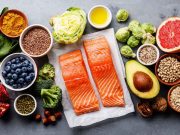“Gut health” describes the function and balance of bacteria of the many parts of the gastrointestinal tract. Ideally, organs such as the esophagus, stomach and intestines work together to allow us to eat/digest food without discomfort. But that’s not the case for an estimated 70 million people in the U.S. with digestive diseases. Hence, the over-flowing shelves of Prilosec, Nexium, Prevacid, Xantac and all PPI’s (proton pump inhibitor drugs) that lead to gut dysbiosis; i.e: the imbalance of the gut microbiome bacteria, if taken too long. These gut microbes affect the way we store fat, how we balance levels of glucose in our blood, and how we respond to hormones that make us feel hungry or satiated.
The wrong internal mix can set the stage for obesity and other health issues later in life.
A healthy gut consists of different bacteria for different people, and this diversity maintains wellness. A shift away from “normal” gut flora diversity is called dysbiosis, and dysbiosis may contribute to disease. Thus, the microbiome has become the focus of much research attention as a new way of understanding autoimmune, gastrointestinal, and even brain disorders.
Scientists have found that gut bacteria produce neurotransmitters that regulate your mood including serotonin, dopamine, and GABA. Researchers have also discovered that a nervous system in your gut (known as the “second brain”), the enteric nervous system (ENS), is a complex system of about 100 million nerves found in the lining of the gut. The ENS communicates with the brain in your head. It also plays a role in certain diseases and in mental health. The gut is no longer seen as an entity with the sole purpose of helping with all aspects of digestion. It’s also being considered as a key player in regulating inflammation and immunity.
In other words, the wellness of both your body and your brain depends on your gut health.
The gut-brain connection is no joke; it can link anxiety to stomach problems and vice versa. Have you ever had a “gut-wrenching” experience? Do certain situations make you “feel nauseous”? We use these expressions for a reason. The gastrointestinal tract is sensitive to emotion. Anger, anxiety, sadness, elation — all of these feelings (and others) can trigger symptoms in the gut.
So how can you keep your digestive system feeling good and functioning optimally? What are the best foods for gut health? Think fiber, fermentation, and nutrient-dense foods. When it comes to maintaining your microbiome at its healthiest level, nothing is more important than what you eat and drink. The internal environment of your gut is dictated by what you put in your mouth — so the foods you choose to eat are a crucial component of maintaining gut health. The good news is, even a lifetime of bad eating is fixable — at least as far as your microbes are concerned. Amazingly, your body can create a new microbiome in as little as 24 hours — just by changing what you eat. What you eat determines which bacteria thrive in your gut. And research tells us that the good “gut bugs” get stronger when fed colorful, plant-based foods. A 2014 study published in the journal The Proceedings of the Nutrition Society found that vegetables, grains, and beans fed a positive gut environment. But meat, junk food, dairy, and eggs fed a negative gut environment.
Two terms — probiotics and prebiotics — are becoming more widely known. Probiotics are beneficial good gut bugs. And prebiotics are food for these bacteria. You can get both probiotics and prebiotics by eating the right foods. Probiotics are found in fermented foods, as well as in some supplements. And prebiotics are found in certain fruits, vegetables, and whole grains. The most essential prebiotic of all is fiber.
Approximately 97% of Americans get at least the recommended amount of protein. But only about 3% of Americans get the recommended 40 grams of fiber they need per day — and fiber is the most crucial ingredient for gut health. Fiber feeds the good bacteria we’ve been talking about, so it’s vital to eat fiber-rich foods as often as possible. Our microbes extract the fiber’s energy, nutrients, and vitamins, including short-chain fatty acids, which can improve immune function, decrease inflammation, and protect against obesity.
Here are a few probiotic-rich foods you may want to incorporate into your daily meal plan to support the health of your gut:
- Kimchi
- Sauerkraut
- Yogurt
- Kefir
- Kombucha
- Miso
- Tempeh
- Fermented AKA “Pickled” Vegetables
- Apple Cider Vinegar
Prebiotic Rich foods include:
- Asparagus
- Chickpeas
- Onions
- Almonds and Nuts
- Fresh Fruits (Raspberries, apples, blueberries, blackberries, etc.)
- Quinoa and Other Whole Grains
- Sweet Potatoes
- Artichokes
- Broccoli and Cruciferous Vegetables
- Bananas
One delicious, excellent gut health dish is a warm bowl of grain goodness or salad.
Gut Health Salad Bowl
Ingredients
- Kale
- Chickpeas
- Broccoli Microgreens
- Fermented Cabbage & Beets
- Blueberries
- Pistachios
- Olive Oil
- Garlic
- Lemon juice
- Quinoa or brown rice
- Any greens
Other Gut Healthy Ingredients
- Sauerkraut
- Kimchi
- Yogurt (make sure the label says it has “live cultures)
- Miso
- Almonds
- Peas
- Brussel Sprouts
- Ginger
- Raspberries & Blackberries





































